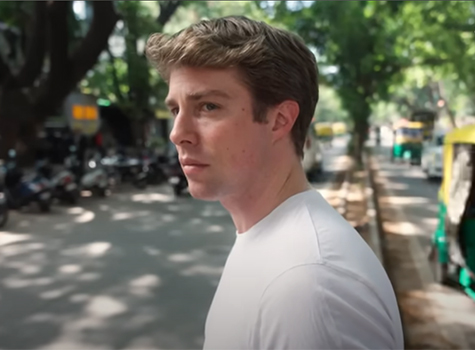
By Samir Shukla
Bringing a book to life in a film seems a daunting task. It’s a dilemma director Ritesh Batra tackled with when bringing author Julian Barnes’ famed Man Booker-winning novel The Sense of an Ending to screen as his second feature film. The result is a subdued and nuanced film that’s a study of the recesses of memory and reflections on the perceived results of one’s actions on other people.
Batra was born in Mumbai in 1979 and his love of film led him to New York where he studied cinema. He made several short films that made noise at film festivals around the world. It was his subtly-crafted film The Lunchbox, starring Irrfan Khan and Nimrat Kaur and released in 2013, that launched his career and announced his arrival as a talented director. The film, his first full length feature, became an international sleeper hit and won rave reviews around the globe. The Lunchbox was decidedly Indian and filmed in Mumbai, Batra’s home base, while his newest film, The Sense of an Ending, is a decidedly British venture.
Batra told me in a recent interview that he is a huge fan of British writer Julian Barnes and was “honored” when he was asked to direct the film version of his novel The Sense of an Ending. Writer Nick Payne had already written the screenplay and Batra set out to visualize the film. The story revolves around 60-something Tony Webster (played by Jim Broadbent) who is a bit of a recluse, living an uneventful existence until secrets of his past during college years are upended one day when he receives news that the mother of his college girlfriend has bequeathed him two documents. The news moves him to recollect those memories of younger years, and the connected lives of his first love Veronica and one of his best friends Adrian. During college, he wrote a harsh letter to Veronica and Adrian upon learning they were now seeing each other. Adrian committed suicide some time later and Webster assumed it was his disturbing letter that led him to do it.
Decades passed and one of the two documents he was now to inherit was a diary written by Adrian. The pursuit of this diary, which the older Veronica will now not release to him, awakens Tony into realizing the past he remembered is not quite true as he further delves into the story.
I haven’t read the book, but have seen films based on books I have read and the two forms of art don’t necessarily mesh, of course. Some books are simply too hard to film, and you can’t film a book by its every word. Batra delved further into this dilemma when I asked him if he felt nervous guiding a beloved book into a film.
“A movie cannot be narration. You have to develop relationships,” Batra explained. He was talking about the challenge of bringing a book to film.
“The material is very hard and a great book is a great responsibility,” he said, explaining that it took a team effort of the screenwriter, the actors, his direction and vision to make the film.
The cast of British actors bring all the characters to life in soft shades and subtle emotions. The film is well-acted, tinged with humor, nicely paced shifting between the present and flashbacks, chatty yet cinematic.
The movie got under my skin, making me think about my own hazy memories and actions from decades ago.
Batra’s direction goads the viewer to peek inside Tony’s life and ethos as he connects memories from college days to his present life. Tony has to deal with the discovery that his assumption of his old friend Adrian committing suicide was not due to the harsh letter he sent to him and Veronica; further investigation reveals something entirely different.
Tony’s impact on the lives of his old friends was much less than he thought, and as he searches for closure by trying to get his hands on the diary, he learns more about himself and how his past interactions may have been more inconsequential than he previously thought.
“In the novel we don’t meet a lot of the characters because it was strictly in Tony’s shoes and Tony is talking to us,” Batra said of the challenge of developing the other characters for the film. When asked how he matched actors with the characters he explained, “We had a round of auditions for the younger parts and the older actors were offered the parts. Jim Broadbent is obviously the right person to play Tony.” The other older actors, especially Charlotte Rampling playing the older Veronica was also a natural match, he said.
Batra’s next project is Our Souls at Night an American drama based on the novel by Kent Haruf. He is currently editing the film which stars Robert Redford, Jane Fonda, and Judy Greer. It will premiere on Netflix sometime in 2017.
The Sense of an Ending, which also stars Harriet Walter, Emily Mortimer, and Michelle Dockery, is scheduled to be released in the US on March 10.



